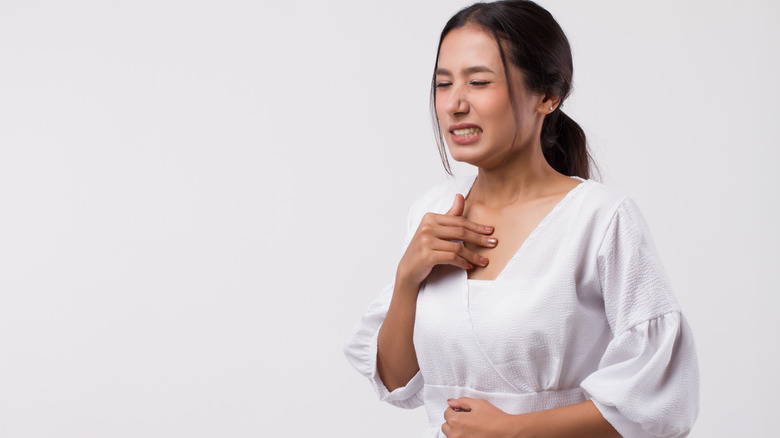Does Coffee Cause Heartburn?
Heartburn is an uncomfortable effect of stomach acid traveling up into the esophagus. A more extreme version of heartburn is GERD, a common cause of heartburn that stands for gastroesophageal reflux disease. If you're prone to GERD and heartburn, you may have noticed that it can often occur after eating particular foods. Common culprits tend to be acidic foods, caffeine, and high-fat foods, via Cedars Sinai. Unfortunately, when you drink your morning cup of coffee, you may be ticking all those boxes.
Coffee is an inherently acidic food on its own and a rich source of caffeine. If you pair it with cream, a high-fat food, you may be inadvertently upping your risk of heartburn. While plenty of anecdotal evidence suggests GERD symptoms tend to worsen when drinking coffee, scientific evidence is lacking, as no clinical studies have confirmed the effects of caffeine on GERD patients, via Medical News Today.
Identifying triggers
For those who love their coffee, some health experts recommend tracking symptoms. Once you identify trigger foods, you can eliminate those that aggravate symptoms accordingly, via Medical News Today. This may mean isolating foods to determine their impacts. For instance, you may try coffee without cream to see if coffee is the cause of heartburn. If you do fine with coffee alone, consider switching to a low-fat creamer. On the other hand, if you suspect coffee may be causing your heartburn, you may opt for a low acid coffee or decaf coffee to try easing symptoms. Some health food stores offer low acid coffee options, and most grocery stores provide decaf coffee options.
If you want to do more exploration with your coffee, consider roasting times and brewing processes that impact the level of acid in coffee. For instance, dark roasted coffees, or coffee roasted for extended periods of time, have less acid than lighter roasted coffee. Additionally, cold brew coffee is less acidic than regular hot drip coffee, via Healthline. It is important to note that as you experiment to identify trigger foods, heartburn typically occurs 30-60 minutes after you eat. Try to consume experimental trigger foods in isolation to be sure of which foods cause symptoms. If symptoms continue, seek guidance from your healthcare professional.

